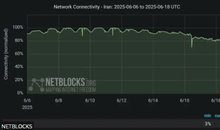
 Flash News
Flash News
Accused of murder due to blood feud, 48-year-old arrested in England
SPAK conducts searches at Ergys Agas' businesses and residences, seizes two vehicles
Members of criminal organizations! 3 Albanians extradited from Dubai today
Berisha warns of new facts about the electoral farce: Don't forget that the laptop hasn't started talking yet
Berisha to gather political leaders tomorrow

It is hot. Very hot. And we're only in the first few weeks of summer.
Nearly one-third of Americans — more than 113 million people — are under a hot weather warning, the National Weather Service in the United States said. In the US, temperatures are expected to set a new record. In El Paso and Texas, temperatures have been above 37 degrees Celsius for 27 days in a row, surpassing the record set in 1994.
In the United Kingdom, the June heat has not only broken records, but has convincingly exceeded the previous temperatures.
June this year was 0.9 degrees Celsius hotter than in the past. A similar situation is reported in North Africa, the Middle East and Asia. So it was no surprise that June was declared the hottest year on record.
And the hot one hasn't faded. The three hottest days ever were recorded last week, according to the European Union's Climate and Weather Service, Copernicus.
The world average temperature touched 16.89 degrees Celsius on July 3 and exceeded 17 degrees for the first time on July 4, with a global average of 17.04 degrees Celsius.
Then, on July 5, a temperature of 17.05 degrees Celsius was recorded. These temperatures are consistent with climate models that have already been predicted, said Professor Richard Betts, a climate scientist at the University of Exeter.
"We should not be surprised by the high temperatures in the world ", he said.
"This is a reminder that we've been hearing for a long time, and we're going to see even hotter weather until we stop putting more greenhouse gases into the atmosphere."
When we think of how hot it is, we think of the air temperature, because we experience it on a daily basis. However, most of the heat stored on the Earth's surface is not in the atmosphere, but in the oceans. And we've seen ocean temperatures hit record highs this spring and summer. For example, in the North Atlantic, temperatures are currently the highest ever. The US Oceanic and Atmospheric Administration has placed this heat wave in category four. Such a categorization is rarely used outside tropical countries and is considered "extremely hot". The El Nino phenomenon, which is active in the Pacific, is also contributing to this situation.
El Nino is a phenomenon that warms the waters off the coast of South America and then they spread across the oceans.
Nëse uji i deteve është më i nxehtë sesa zakonisht, edhe ju do të përballeni me temperaturë të lartë të ajrit, ka thënë Tim Lendon, profesor për ndryshime klimatike në Universitetin Exeter.
Ai sqaron se pjesa më e madhe e të nxehtit është krijuar nga gazrat serrë dhe është ruajtur nëpër sipërfaqe të oqeaneve.
Ndonëse ai i nxehtë ka tendencë të zhytet brenda në oqeane, fenomene sikurse El Nino, mund ta nxjerrin atë sërish mbi sipërfaqe.
“Kur ndodh diçka e tillë, sasi e madhe e të nxehtit del në atmosferë”, ka thënë profesori Lenton.
Është e lehtë të mendojmë se ky mot tejet i nxehtë është i pazakonshëm, mirëpo e vërteta e dhimbshme është se ndryshimet klimatike nënkuptojnë se tani do të jetë normale që të përballemi me temperatura rekorde.
Greenhouse gases continue to be emitted every year, even with an increasing trend. The hotter the global temperature, the greater the risk of heatwaves, said Friederike Otto, a climate expert at the Grantham Institute for Climate Change.
"These heat waves will not only be more frequent, but also hotter and longer ," she said.
Experts have already predicted that El Nino could make 2023 the hottest year on record. The Earth's temperature has risen by 1.1 degrees Celsius since the start of the industrial age, and temperatures will continue to rise unless governments around the world take steps to curb carbon emissions./ REL
Latest news


Vote recount in Tirana, Kaso: We did not have the 14th mandate as our objective
2025-06-19 22:44:53




Noka: Policemen were running from morning to night for SP votes
2025-06-19 21:31:03
The three zodiac signs that will be disappointed in love this month
2025-06-19 21:18:48
Accused of murder due to blood feud, 48-year-old arrested in England
2025-06-19 21:06:57
Vasili releases video: Tirana-Kashar segment full of gravel, no workers around!
2025-06-19 21:00:48

Tirana without a coach, four names considered for the white-and-blue bench
2025-06-19 20:21:12

Rinderpest/ A new outbreak appears in Shkodra, 200 sheep affected
2025-06-19 20:01:50

Scientists raise the alarm: Earth risks exceeding the 1.5°C warming limit!
2025-06-19 19:37:44

"Fiscal Peace" without consultation with the EU, Brussels concerned
2025-06-19 19:05:23
Trump signs executive order extending TikTok ban in US for another three months
2025-06-19 19:03:35

A special Task Force on immigration is established in cooperation with Italy
2025-06-19 18:23:58
Drug trafficking gang busted in Italy, 25 people arrested, including Albanians
2025-06-19 18:18:33
AMF denounces a suspicious cryptocurrency investment platform
2025-06-19 18:06:07


Technology as a tool of war between Israel and Iran
2025-06-19 17:27:54




EU divided over Israel's right to bomb Iran
2025-06-19 16:10:42

Analysis/ How is Russia spreading propaganda in the Albanian language?
2025-06-19 15:49:18
Session in the Criminal Court, MP Qani Xhafa is fined
2025-06-19 15:33:30
Members of criminal organizations! 3 Albanians extradited from Dubai today
2025-06-19 15:20:04

Lufta/ Zelenskyy bën thirrje për rritjen e presionit ndaj Rusisë
2025-06-19 14:56:02

Netanyahu warns Iran after attacks on Israeli hospital
2025-06-19 14:34:53

Attempted to enter Albania with false documents, 25-year-old arrested
2025-06-19 14:18:20
Psychology explains what happens in the brain of a person contemplating suicide
2025-06-19 14:01:25

These are the coldest zodiac signs
2025-06-19 13:45:18



Albanian man dies in hospital after accident in Italy
2025-06-19 13:02:45


Berisha to gather political leaders tomorrow
2025-06-19 12:32:23

Iran confirms meeting with representatives of Britain, Germany and France
2025-06-19 12:11:33


The constitution of the Kosovo Assembly fails for the 34th time
2025-06-19 11:30:28


Albania's nuclear bomb!
2025-06-19 10:52:02

Prej 4 ditësh e zhdukur, humb gjurmët adoleshentja shqiptare në Greqi
2025-06-19 10:33:11
Choosing a child's name, expert reveals three key factors
2025-06-19 10:29:17


Another request for release from house arrest
2025-06-19 09:49:14
Who is the 18-year-old who stole the crown of "Miss Albania 2025"?
2025-06-19 09:41:37

Arrestohet punonjësi i shërbimeve funerale, vidhte në varrezat e Korçës
2025-06-19 09:13:03
Foreign exchange, June 19, 2025
2025-06-19 09:00:33
Montenegrin arrested in Spain for involvement in a structured criminal group
2025-06-19 08:55:04
BBC: Trump has approved the plan to attack Iran
2025-06-19 08:45:01
Draft reports from Brussels expose 'government facade' towards integration
2025-06-19 08:31:21
Horoscope, what do the stars have in store for you today?
2025-06-19 08:17:33

Morning Post/ In 2 lines: What mattered yesterday in Albania
2025-06-19 07:49:56

Zhulali: EU does not tolerate basic standards, membership is a political process
2025-06-18 22:40:09
Recount process/Këlliçi: DP seeks 14th mandate in Tirana
2025-06-18 22:11:20
Hell in the Gjadri camp, 45 attempted injuries and violent protests
2025-06-18 21:49:49


Israel strikes National Police headquarters in Iran, several injured reported
2025-06-18 21:29:11




Why World War III is 'speaking', and the Albanian PM Rama is silent
2025-06-18 20:08:03
Avoid drying towels in the sun, here's how to keep them soft
2025-06-18 20:07:53

Cannabis legalization in Albania, new law, old risks
2025-06-18 19:39:54

Pope Leo XIV calls for peace: Advanced weapons are temptations we must reject
2025-06-18 19:22:29
Iran faces near-total internet blackout
2025-06-18 19:07:09




INSTAT: Heart diseases, the leading cause of death in Albania during 2024
2025-06-18 18:05:33

